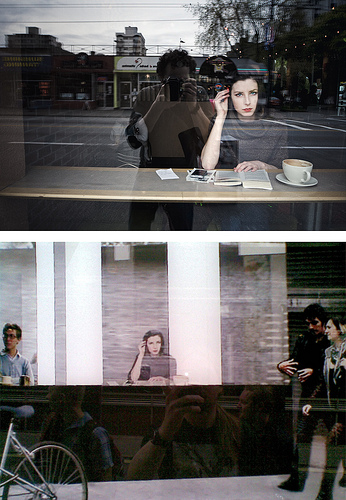
Copyright infringement is galling at the best of times (that’s if there really is a ‘best of times’ for someone stealing your work) but when people who really should know better screw up, it’s a complete kick in the guts. You’d like to think that people who are creative themselves, who teach creative pursuits, or promote creative endeavours would stand up for other people’s copyright, not trample over it roughshod, wouldn’t you? We should be so lucky.
This week started with the Lady Gaga fiasco, when the bizarrely-dressed music mega-star who also happens to be the Creative Director of Polaroid, demanded that photographers on her Monsters Ball tour surrender the copyright of any pictures taken at the shows. Sheesh, woman! Who owns the copyright of the music that you make? How do you make (some of) your money? So who owns the copyright of a photo? How do photographers make their money? Think about it and get back to me.
Then Haje finds out that a school in Canada has been reproducing his work wholesale as part of its photography course. Yes dear students, some of you might wish to go on and make money by taking photos or writing books or producing music, but don’t expect to ever be able to make a living from it because people like your teachers can just rip it off without giving you any due.
Finally an open letter from the Association of Photographers to the Photographers’ Gallery dropped into my inbox last night. Here, you can read what it says for yourself:
8 March 2011
Brett Rogers
The Photographers’ Gallery
16-18 Ramillies Street
London W1F 7LW
Dear Ms Rogers
It is with very great concern that we note the unauthorised use of a photograph made by John Goldsmith titled ‘Porcelain’ which resides on his Flickr Photostream and which has been used as part of a computer-generated impression to promote and publicise the new Photographers’ Gallery building.
As a trade body representing professional photographers, working to promote best practice and securing and protecting the rights of photographers everywhere, we are sure that you would not condone such a breach of a creator’s rights and would join with us in condemning what amounts to theft of someone else’s intellectual property.
We trust that as an organisation dedicated to promoting the best in photography, you are equally committed to respecting and honouring the rights of others, and will ensure that the photographer is paid the commercial rate for the use of his image as a matter of urgency.
Yours sincerely
The Association of Photographers
You might need to pinch yourself, but I can assure you that you’ve not misread it. The Photographers’ Gallery, an organisation designed to promote and support photographers and their work, allowed John Goldsmith’s photo to be used as part of its marketing campaign for the refit of its shiny new building, without asking his permission or offering him recompense.

Above: Porcelain by John Goldmsith. Below: unauthorised use of Porcelain in publicity for the Photographers' Gallery (photo courtesy of Joni Karanka).
The AoP stepped in when Goldsmith was pushed from pillar-to-post by the Photographers’ Gallery and their architects, each denying responsibility for failing to get permission to use the image. O’Donnell and Tuomey, the architects, have had the cheek to argue that they don’t need to reimburse Goldsmith because they’ve given him months of free publicity. Hogwash!
Goldsmith points out on his website that the original image was a candid street shot not intended for commercial use: he doesn’t even know who the woman in the picture is. In fact, if you’re her, or you know her, he’d like you to get in touch.
There’s just so much that’s wrong with the attitude of the Photographers’ Gallery that I’m astonished. Exactly which photographers are they promoting and supporting here? Precisely whose work and income are they managing to protect? Something tells me that they’d better move fast to rectify this one, or their credibility will be on very rocky ground.
In fact, I’m astonished that anyone who works in a creative capacity isn’t prepared to stand up for the copyright of any other creative individual. It’s an uphill struggle for those of us trying to earn a living by writing books, making music, taking photos, or producing art, at least until we hit the very big time. A little bit of co-operation goes a long way. It’s far better than cannibalism.
And for anyone who says that copyright is complicated: hell’s bells people, it’s copyright, not astrophysics.
(You can read more about the Lady Gaga fiasco in Rolling Stone, whilst John Goldsmith gives the story of Porcelain in his own words on his website.)









